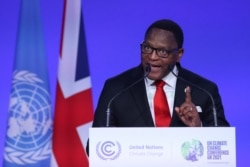Malawi's president, Lazarus Chakwera, has called on the country to transition from largely subsistence farming to industrialized commercial farming, in order to meet the goal of making the country food-sufficient by 2030.
Speaking as he opened the National Agriculture Fair in Blantyre, Chakwera said it is concerning that 80% of farmers in Malawi are small-scale farmers while the country has vast resources that could transform it into a commercial farming nation.
"It is in this sector that most of our jobs are being created," he said. "It is from this sector that our growth domestic product, GDP, is receiving its greatest boost. It is in this sector that our exports and forex earnings are growing from. It is this sector whose success will give us the capacity to diversify our economy and make it more resilient and sustainable."
The more the farmers engage in high value agriculture and add value to their products, the more they will see their profit margin rise, Chakwera said.
The president added that his emphasis on agriculture does not mean that he does not dream of Malawi also thriving from tourism, mining and telecommunication.
"It is just that at this stage of our national development, making our agriculture sector a success is foundational to diversifying our economy," he said. "The next time you hear someone admiring America's economy, tell them that the big part that keeps their economy strong and finances its diversification, is agriculture."
The United States is the highest producer of corn, the second highest producer of soybeans and the fourth highest producer of wheat in the world, Chakwera said. Malawi is making efforts to transform its agriculture sector, he added, and that includes the government's emphasis on moving from largely rain-fed agriculture to irrigation farming.
"As a case in point, in the 2021/2022 national budget, import duty on agriculture machinery was waived, precisely to make irrigation equipment more affordable and accessible. In fact, our entire economic policy framework is driven by our unapologetic desire to build an agriculture sector of the future," he said.
However, farmers are skeptical about the president's words.
Masauko Kabapha, who owns the Chimwemwe farm in Kasungu District in central Malawi, said commercialized farming in Malawi can only be possible if banks are more flexible with farmers.
Commercial farming in Malawi is impossible, he said, because farming equipment and machinery are too expensive for a small farmer, and getting a loan is difficult because banks ask for collateral, which most farmers cannot manage.
Kabapha suggested the government enact policies to restrain commercial banks from asking for collateral.
He also said that, although the government has waived duty charges on machinery for irrigation farming, most areas of Malawi still lack the necessary equipment. Most of the dams and water reservoirs that were built for that purpose are not functional and need rehabilitation, he added.





